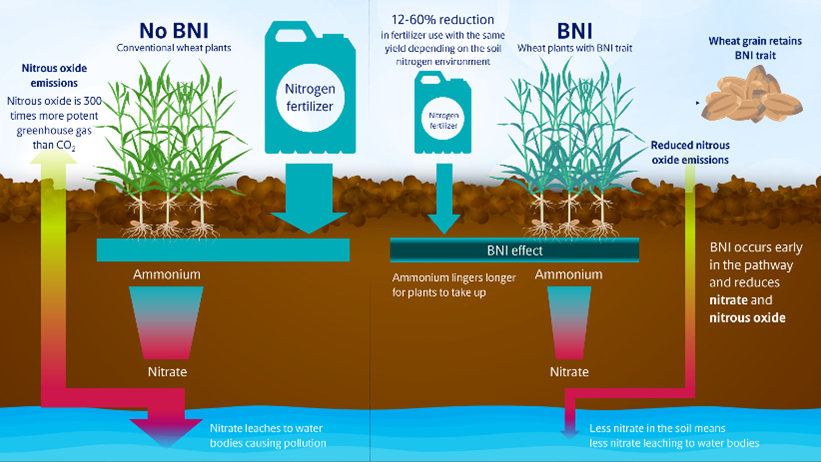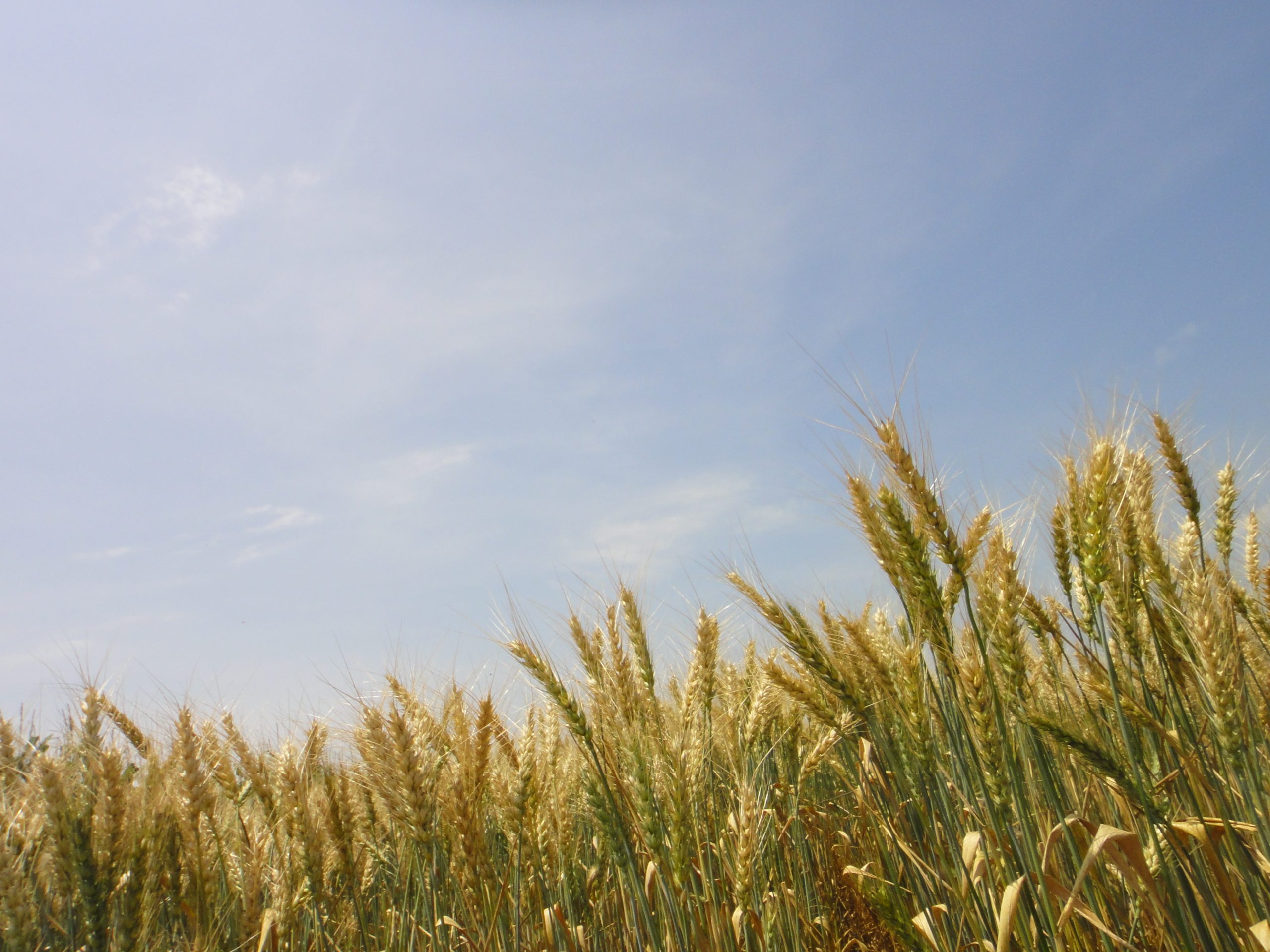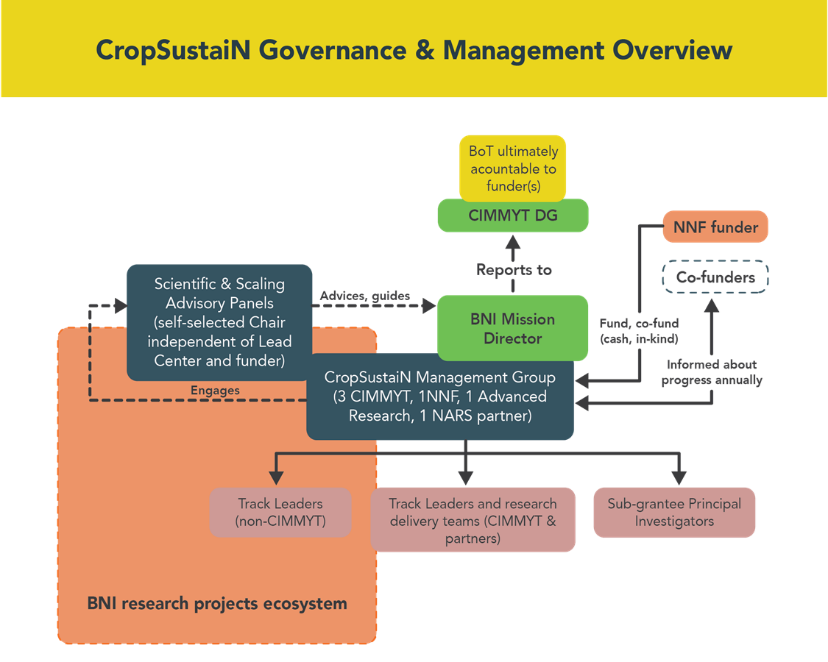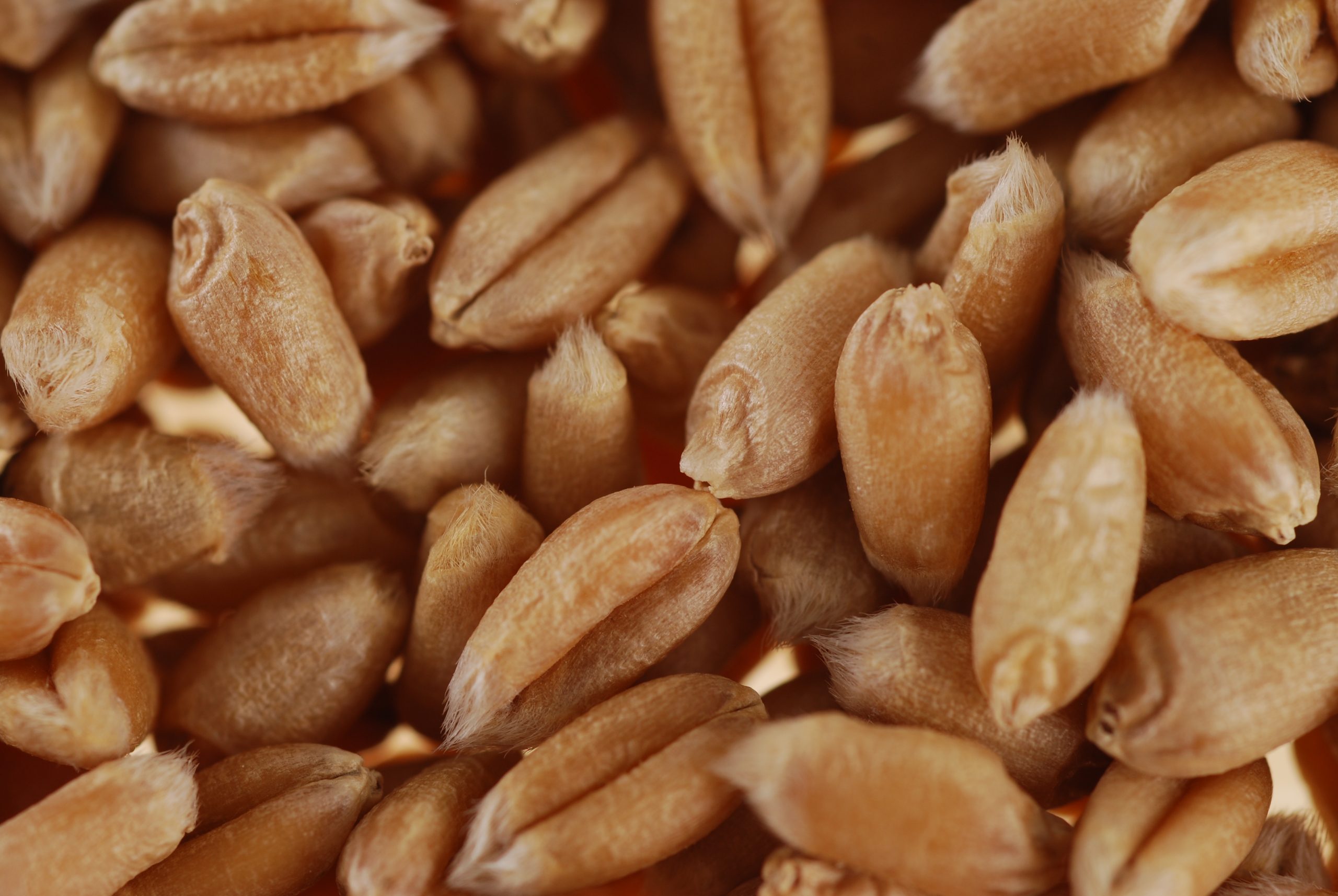The Novo Nordisk Foundation and CIMMYT have launched the 4-year CropSustaiN initiative to determine the global potential of wheat that is significantly better at using nitrogen, thanks to Biological Nitrification Inhibition (BNI)—and to accelerate breeding and farmer access to BNI wheat varieties.
With a budget of US$ 21 million, CropSustaiN addresses the pressing challenges of nitrogen pollution and inefficient fertilizer use, which contribute to greenhouse gas (GHG) emissions and ecological degradation. Currently, no other seed or agronomic practice-based solution matches BNI crops’ mitigation impact potential. Growing BNI crops can complement other climate mitigation measures.
The challenge
Agriculture is at the heart of both food and nutrition security and environmental sustainability. The sector contributes ca. 10-12% of global GHG emissions, including 80% of the highly potent nitrous oxide (N2O) emissions. Fertilizer use contributes to such N losses, because plants take up about 50%, the remainder being lost. Wheat is the world’s largest ‘crop’ consumer of nitrogen-based fertilizer—a relatively nitrogen-inefficient cereal—at the same time providing affordable calories to billions of resource-poor people and ca. 20% of globally consumed protein. CropSustaiN targets this nexus of productivity and planetary boundary impact by verifying and thus de-risking the needed breeding, agronomic, and social innovations.

A solution: BNI-wheat
BNI is a natural ability of certain plant species to release metabolites from their roots into the soil. They influence the nitrogen-transforming activity of nitrifying bacteria, slowing down the conversion of ammonium to nitrate in the soil. This preserves soil ammonium levels for a longer time, providing plants with a more sustained source of available nitrogen and making them more nitrogen-use efficient (nitrogen plant use efficiency). As a result, BNI helps reduce the release of N2O gas emissions and nitrate leaching to the surrounding ecosystem.
A research breakthrough in 2021, led by the Japan International Research Center of Agricultural Sciences (JIRCAS) in collaboration with CIMMYT, demonstrated that the BNI trait can be transferred from a wheat wild relative to a modern wheat variety by conventional breeding. BNI wheat can be made available to farmers worldwide.
Growing BNI wheat could reduce nitrogen fertilizer usage by 15-20%, depending on regional farming conditions, without sacrificing yield or quality.
Incorporating BNI into additional crops would reduce usage further. Farmers can get the same yield with less external inputs.
Other BNI-crops
CropSustaiN will work on spring and winter wheats. Rice, maize, barley, and sorghum also have BNI potential. CropSustaiN will build the knowledge base and share with scientists working on other crops and agronomic approaches.
Objectives and outcomes
This high risk, high reward mission aims to:
- Verify the global, on-farm potential of BNI-wheat through field trial research and breeding.
- Build the partnerships and pathways to meet farmer demand for BNI-wheat seeds.
- Work with stakeholders on policy change that enables BNI crops production and markets
Success will be measured by determining nitrogen pollution reduction levels under different soil nitrogen environments and management conditions on research stations, documenting crop performance and safety, breeding for BNI spring and winter wheats for a wide range of geographies, and gauging farmer needs, interest, and future demand.

A collaborative effort
CIMMYT is the lead implementer of Novo Nordisk Foundation’s mission funding. CropSustaiN’s interdisciplinary, intersectoral, systems approach relies on building partnerships and knowledge-sharing within and outside this research initiative. 45+ partners are engaged in CropSustaiN.
The potential GHG emissions reduction from deploying BNI-wheat is estimated to be 0.016-0.19 gigatonnes of CO2-equivalent emissions per year, reducing 0.4-6% of total global N2O emissions annually, plus a lowering of nitrate pollution.
Impact on climate change mitigation and Nationally Determined Contributions (NDCs)
The assumption is that BNI wheat is grown in all major wheat-growing areas and that farmers will practice a behavioral shift towards lower fertilizer use and higher fertilizer use efficiency. That could lead to ca. a reduction of 17 megatons per year globally. This can help nations achieve their NDCs under the Paris Agreement.
International public goods, governance, and management
CIMMYT and the Foundation are committed to open access and the dissemination of seeds, research data, and results as international public goods. The governance and management model reinforces a commitment to equitable global access to CropSustaiN outputs, emphasized in partnership agreements and management of intellectual property.

Invitation to join the mission
The CropSustaiN initiative is a bold step towards agricultural transformation. You are invited to become a partner. You can contribute to the mission with advice, by sharing methods, research data and results, or becoming a co-founder.
Please contact CropSustaiN Mission Director, Victor Kommerell, at v.kommerell@cgiar.org or Novo Nordisk Foundation’s Senior Scientific Manager, Jeremy A. Daniel, at jad@novo.dk.
Additional reference material
- BNI International Consortium (Japan International Research Center for Agricultural Sciences, JIRCAS)
- Nitrification inhibitors: biological and synthetic (German Environment Agency, Umweltbundesamt)
- CropSustaiN: new innovative crops to reduce the nitrogen footprint form agriculture
- Annual Technical Report 2024. CropSustaiN: A new paradigm to reduce the nitrogen footprint from agriculture
- BNI-Wheat Future: towards reducing global nitrogen use in wheat
- CIMMYT Publications Repository

